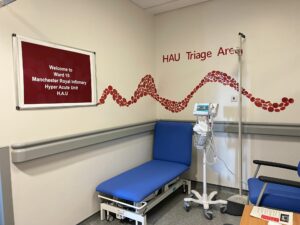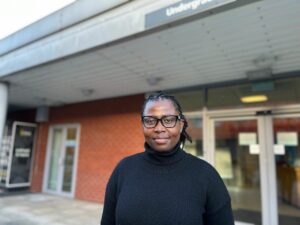Patients in the North West living with a rare blood disease have welcomed the launch of a pioneering new specialist unit and 24/7 helpline to support them during emergencies.
 The new Sickle Cell Unit based at Manchester Royal Infirmary, part of Manchester University NHS Foundation Trust, is the first of its kind in the country and will support patients living with sickle cell disease (SCD) in Greater Manchester, Lancashire and Cumbria.
The new Sickle Cell Unit based at Manchester Royal Infirmary, part of Manchester University NHS Foundation Trust, is the first of its kind in the country and will support patients living with sickle cell disease (SCD) in Greater Manchester, Lancashire and Cumbria.
Sickle cell disease is most prevalent in people of black African and Caribbean heritage. The serious, lifelong condition can cause organ failure, strokes, loss of vision, and can be fatal.
The unit will support patients in sickle cell crisis by giving them highly specialist treatment to treat them. A sickle cell crisis occurs when blood vessels to part of the body become blocked. The pain can be severe and last for several days or weeks. A sickle cell crisis can affect any part of the body but is most common in the limbs or back.
 Dr Joseph Sharif, a consultant who specialises in treating patients with sickle cell at Manchester Royal infirmary, said: “We’re very pleased to be opening this new service to support patients living with sickle cell disease.
Dr Joseph Sharif, a consultant who specialises in treating patients with sickle cell at Manchester Royal infirmary, said: “We’re very pleased to be opening this new service to support patients living with sickle cell disease.
“The new Sickle Cell Unit is a dedicated space for patients in a sickle cell crisis to be treated quickly by medical professionals who are trained and experienced in supporting patients with this disease.
“A sickle cell crisis can be excruciatingly painful, and potentially fatal if not treated. Whilst more is being done to improve awareness and training, patients sometimes experience difficulties accessing treatment quickly in an emergency.
“This new unit and triage service will aim to improve access to specialist clinical treatment and mean that patients can be seen quickly and receive pain relief and other treatment when experiencing a crisis.”
Patients living with sickle cell disease produce unusually shaped red blood cells that can cause problems because they do not live as long as healthy blood cells and can block blood vessels.
 Elizabeth Naamorkor Caulley, 49, a Student Experience Coordinator at MFT who also lives with sickle cell disease, welcomed the opening of the new service, and described her experience of crisis.
Elizabeth Naamorkor Caulley, 49, a Student Experience Coordinator at MFT who also lives with sickle cell disease, welcomed the opening of the new service, and described her experience of crisis.
She said: “I can use so many words to describe it: excruciating, agonising, painful, severe. When you have a sickle cell crisis it can feel like your whole body is on fire.
“This new service is so helpful for people living with sickle cell disease. Having a number to call 24/7 when a crisis happens is so important. It means that we can be seen quickly by medical professionals who are experienced in supporting patients with sickle cell and who know exactly how to help.
“As sickle cell patients we also need to speak more about our experiences. It’s really, really important as we all know about diseases like diabetes and cancer and I think sickle cell needs to be known about as well so patients can get the treatment they need in a crisis.”
The new service will support patients with sickle cell disease in Greater Manchester, Lancashire, and Cumbria. Patients experiencing a crisis are encouraged to contact the 24/7 triage phone line. This is staffed by sickle cell trained nurses who will be able to provide advice and sign post patients to the most appropriate clinical service to meet their needs. This will enable them to be seen quicker if their crisis is so severe that it requires hospital admission.
If patients are unable to quickly travel to the Manchester Royal Infirmary, for example patients living in Lancashire or Cumbria, the service provides an on-call Haemoglobinopathy consultant who can liaise with medical teams at a patient’s local hospital to provide advice on the care and treatment needed to manage the sickle cell crisis.
Anthony Mason, Chief Executive of Sickle Cell Care Manchester, said: “The new service is an absolute lifeline for those living with Sickle Cell.
“Knowing that there are dedicated doctors and nurses with a thorough knowledge, understanding, and empathy towards this difficult, life-altering genetic blood condition is something well needed and 100% welcome.
“Rapid assessment is key for someone with sickle cell disease. A sickle pain crisis needs pain relief and follow-up treatment as soon as possible. The new unit will help to ensure that this happens more often for more people”.
Charles Kwaku-Odoi DL, Chief Executive of the Caribbean & African Health Network (CAHN), said:
“The introduction of this new unit means that sufferers of sickle cell disease can expect to be treated by health professionals who are knowledgeable about their condition, enabling them to gain access to emergency care within a shorter amount of time and therefore lessening the impact of sickle cell crises and the associated health risks.
“As an organisation committed to ending health inequalities disadvantaging Black people across the UK, we consider this to be an important step in the right direction.”
The service is also supported out-of-hours by NHS Blood and Transplant’s Therapeutic Apheresis Service’s unit, a specialist team whose treatments include red cell exchanges – where donor blood is transfused at the same time as removing the patient’s own blood – which are sometimes required to treat a sickle cell crisis.
Dr Jayne Peters, Consultant Haematologist in NHS Blood and Transplant’s Manchester TAS team, said: “A sickle cell crisis can be very painful for patients with a risk of complications such as organ damage.
“As part of this new pathway, NHS Blood and Transplant will provide emergency red cell exchange transfusions out of hours across the region. This procedure rapidly replaces the crescent-shaped sickle blood cells with healthy donor blood, improving the patient’s symptoms such as severe pain and shortness of breath.
“To undertake the emergency red cell exchange procedures, we are reliant on donors from a similar ethnic background to keep on providing blood for patients with sickle cell disease to ensure the best possible match.
“It is therefore vital more people of black African and Caribbean heritage come forward to donate. It is quick and easy to do.”